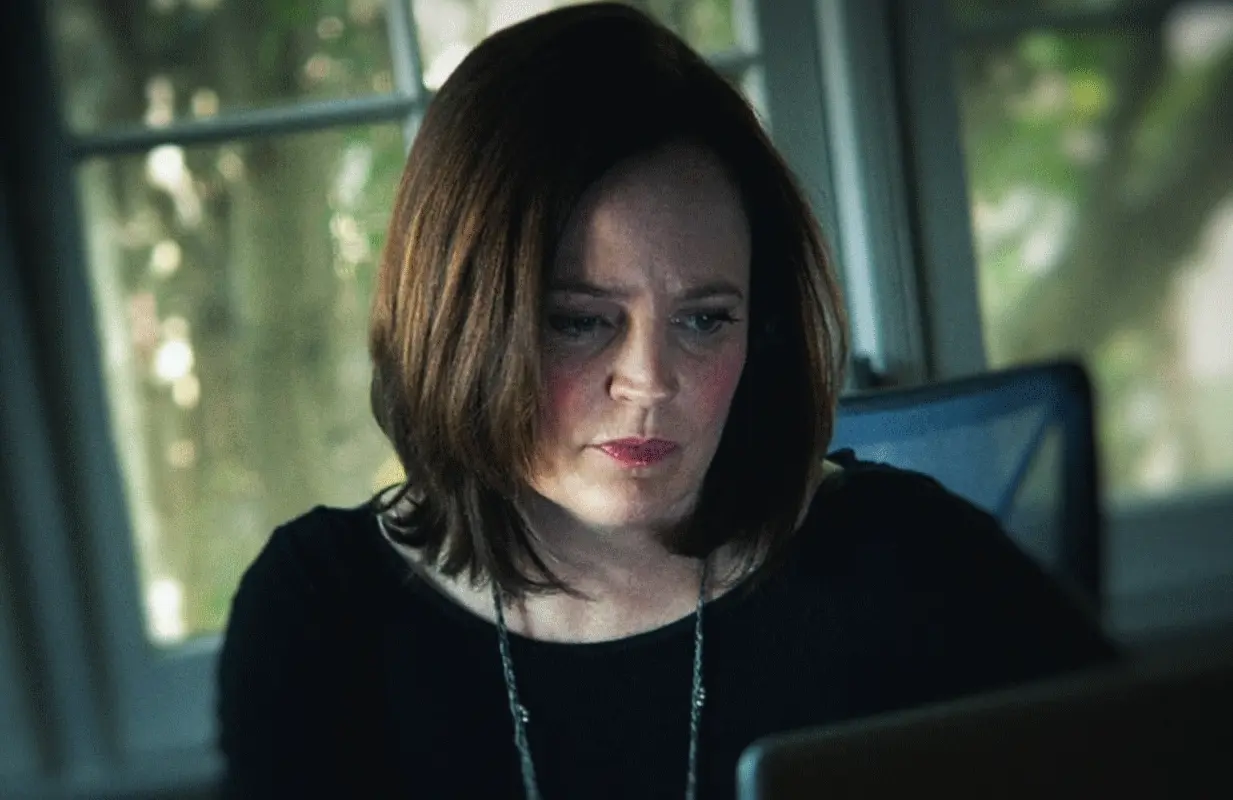HBO's I'll Be Gone In The Dark Follow-Up Special Disappoints
-
 Serial killer-hunter Michelle McNamara in a photo from I'll Be Gone in the Dark. (HBO)
Serial killer-hunter Michelle McNamara in a photo from I'll Be Gone in the Dark. (HBO)The editor-in-chief of the daily newsletter Best Evidence, Sarah D. Bunting knows a thing or two about true crime. Her weekly column here on Primetimer is dedicated to all things true crime TV.
A lot has happened since I'll Be Gone In The Dark premiered a year ago — both in the world at large and in the world of I'll Be Gone's central case, that of the long-unsolved EAR-ONS/Golden State Killer.
A sensation when it premiered in 2020, HBO's original six-part docuseries carefully unpacked the late author Michelle McNamara's quest to identify the Golden State Killer and bring him to justice, the toll that search ultimately took on her, and the role her research played in the ultimate capture of serial burglar, rapist, and murderer Joseph James DeAngelo. The series itself was completed before it could include DeAngelo's sentencing, or the victim-impact statements from the sentencing hearings that made headlines in the summer of 2020, so a "one year later" followup episode clearly made sense to HBO and the filmmakers.
The trouble is, this new episode doesn't seem sure of what it is: an update on the case and sentencing, or a backdoor pilot of sorts to a second season — one that centers on the 1980s Oak Park, IL case that first attracted McNamara to unresolved true-crime stories. So instead it splits the difference, and the end result doesn't cover either particularly well.
The episode does have compelling moments. One particular wide shot of the sentencing hearings featuring a big screen suspended over a dais so that the survivors and other participants — rigidly spaced six feet apart — can see and hear everything that happens in a COVID-restricted setting, is chilling... not only for its Orwellian visuals, but also as a flashback to the everyday dread of infection that so many of us lived in 2020. Also disquieting is the contrast between the diminished oldster in a crooked face shield that DeAngelo performs for the courtroom, and the seemingly with-it and spry prisoner who's caught by a jailhouse camera clambering up on the cell furniture to make interior-design tweaks. And although the survivors' statements in court are difficult to watch, it's important and powerful testimony, both literally and figuratively. A few survivor-centric segments have the whiff of network-newsmag cheese, but the filmmakers could have created a powerful follow-up narrative by focusing solely on GSK survivors and the pronouncing of sentence on DeAngelo.
Instead I'll Be Gone moves back and forth between updates on the GSK case, and the attacks on Kathy Lombardo and others in Oak Park that preoccupied Michelle McNamara through much of her life — in way that suggests I'll Be Gone intended to move into a second season centered on those crimes. HBO's own description of the episode hints at that goal, saying that the special "closes one chapter in McNamara's investigative work on cold cases, and brings to light another … which sparked her life-long fascination with unsolved murders."
Chyrons at the end of the special imply that the production may have attempted to frame out a second season, but wound up stymied by Oak Park PD's refusal to share documents. It's not a bad concept; using McNamara's research into that case as a jumping-off point, and perhaps also using the co-authors who helped finish McNamara's book posthumously, I'll Be Gone could enter a new phase of its own... and, not for nothing, leave behind some of the less successful aspects of the original HBO property. (The Amy Ryan-as-McNamara voice-over is back in the special episode, and it continues not to work for me, emphasizing a melodramatic bent in McNamara's writing that serves neither the story nor her memory.) But because this second iteration isn't forthcoming, what we see of that story doesn't really go anywhere, and viewers may wonder why the Oak Park content wasn't reworked or scrapped altogether.
I'll Be Gone's special episode isn't a waste of time — even if it were, it's only 49 minutes' worth — but its chief effect is to make viewers wish, once again, that Michelle McNamara had lived to see the results of her work, and to do more work like it. That isn't possible, of course... but if a second season and/or further investigation of the attacks that drew McNamara to the genre isn't possible either, one can't help but wonder why this special exists in its current form at all..
HBO's special episode of I'll Be Gone in the Dark premieres Monday June 21st at 10:00 PM ET
People are talking about I'll Be Gone in the Dark in our forums. Join the conversation.
Sarah D. Bunting co-founded Television Without Pity, and her work has appeared in Glamour and New York, and on MSNBC, NPR's Monkey See blog, MLB.com, and Yahoo!. Find her at her true-crime newsletter, Best Evidence, and on TV podcasts Extra Hot Great and Again With This.
TOPICS: I'll Be Gone in the Dark, HBO, Amy Ryan, Michelle McNamara, True Crime